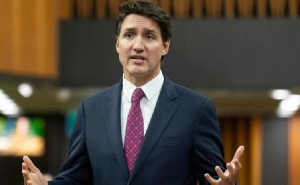


 Canadian Prime Minister Justin Trudeau
Canadian Prime Minister Justin Trudeau
Canadian Prime Minister Justin Trudeau's government has been thrown into fresh disarray with the abrupt departure of his finance minister, Chrystia Freeland.
By the end of a frenetic Monday, a new finance minister was in place, but Trudeau was facing calls from members of his own Liberal Party to quit.
Without directly referring to the news, the prime minister told party donors at an event in Ottawa: "It's obviously been an eventful day. It has not been an easy day."
In her scathing resignation letter - published on the day she was due to deliver an economic statement - Freeland cited disagreements with her long-time ally on how to respond to the threat of tariffs from Donald Trump.
The US president-elect, who will return to the White House in January, has vowed to impose a levy of 25% on imported Canadian goods unless the shared border is made more secure.
Economists say the tariffs could have a devastating effect on Canada's economy.
In her letter, Freeland accused Trudeau of choosing "costly political gimmicks" over addressing the threat posed by Trump's "aggressive economic nationalism".
Trump himself later responded to Freeland, posting that her "behaviour was totally toxic, and not at all conducive to making deals which are good for the very unhappy citizens of Canada".
Freeland said her decision came after Trudeau told her last week that he no longer wanted her to be the government's top economic adviser.
Her departure blindsided the government, leaving the fate of the scheduled economic update in the air for hours and bringing Trudeau and his shaky minority Liberals to the brink.
In a further blow, the Liberals lost control of the Cloverdale-Langley City seat in British Columbia, after a by-election win for rival Conservatives. It was the Liberals' third by-election defeat of the year.
Freeland's sudden exit as finance minister earlier in the day "just makes Canada look quite confused and uncertain", Chris Sands, director of the Wilson Center's Canada Institute, told the BBC.
"Trudeau finds himself a little bit alone, not super close to any of his ministers, with the big, talented ones mostly now having left," he added.
Mr Sands said Trump's win in November's US presidential election has caused a split among US allies, including Canada.
"Do you respond to Trump by pushing back and standing firm, or do you respond by trying to find a way to avoid conflict?" he said.
Trudeau has made overtures to Trump, including flying to Mar-a-Lago, the president-elect's Florida estate, last month to dine with the president-elect.
But Freeland's perspective, said Mr Sands, was closer to that of Mexico - also facing a tariff threat - and Mexican President Claudia Sheinbaum.
Mexico has positioned itself under the idea that "now is the time to say no, to push back, to take a fighting stance", he said.
Many politicians remember the challenges they faced during Trump's first term in office, he added.
"He hasn't been inaugurated yet, but people are already reacting as though he was the president and taking serious measures."
Freeland, who also served as deputy prime minister, had been Ottawa's lead during the first Trump administration in the successful re-negotiation of the US-Canada-Mexico free trade pact.
It was "a really stressful and overwhelming process for Canada", Mr Sands said.
In addition to the members of the prime minister's own party who called on him to quit, Canada's three opposition party leaders said on Monday that Trudeau must go.
Pierre Poilievre, leader of the opposition Conservative Party of Canada, called for a federal election as soon as possible.
"Everything is spiralling out of control. We simply cannot go on like this," he said.
Canada's next federal election must be held in October, at the latest.
Laura Stephenson, chair of the political science department at Western University, told the BBC that it was not clear that a change in leadership would affect the current US-Canada dynamic.
"I have no confidence that Trump will react any differently to Poilievre than he does to Trudeau," she said.
After nine years in power, Trudeau has faced growing calls to resign over concerns he is a drag on his party's fortunes.
The Liberal leader's approval rate has plummeted from 63% when he was first elected to 28% in June of this year, according to one poll tracker.
Opinion polls also suggest the Liberals could face a devastating loss to the Conservatives if an election was held today.
Some Liberal members of parliament have been pressuring Trudeau for months to step down - seven MPs have gone public, CBC reports.
Trudeau did not take questions on his way to the fundraiser in Ottawa, but he told the crowd he was "damn proud" of his government's accomplishments.
In brief remarks, he said working for Canadian values was "at the core of what makes us Liberals".
"That's why we show up here, even on the toughest days as a party."
Trudeau has defied previous calls to step aside and has said repeatedly that he plans to run in the next federal election.
Also on Monday, the leaders of Canada's provinces and territories met in Toronto to address Trump's tariff threat.
"It's chaos right now up in Ottawa", said Ontario Premier Doug Ford.
Ford said the premiers will "make sure that we tell the world there is stability here, there is certainty here in Canada".